Public Broadband Hits Bureaucratic Boulders
Planners “Pause” intermunicipal study; leaders react
by Robert Lynch, August 27, 2021
From the mood in the zoom room that afternoon, you might have thought someone had died. Maybe death did strike; not of some-one; but rather, some-thing. What perished may have been that much-touted Tompkins County study into governmentally-managed rural broadband.

“I hate to be cynical, but it almost seems like we were set up for failure from the get-go with the way the study was done,” Danby Supervisor Joel Gagnon told his fellow municipal leaders on the Tompkins County Council of Governments (TCCOG). Thursday (Aug. 26th), TCCOG members got their first opportunity to discuss the County Planning Department’s decision three weeks earlier to “pause” a consultants’ study into possibly creating a county-wide, governmentally-run broadband network. The proposal was intended to extend cables to unserved areas and also to increase rural Internet competition.
Dryden Supervisor Jason Leifer agreed with Gagnon. “The County set itself up for failure,” Leifer said, “but that’s because the County didn’t really want to succeed in the first place.”
In a surprise memo to TCCOG members, and municipal leaders August 6th, Katie Borgella, Tompkins County’s Commissioner of Planning and Sustainability, revealed the Department’s decision to pull the plug temporarily on the $80,000 study, launched with much fanfare last October. The County contracted jointly with Fujitsu Corporation and the Southern Tier Network (STN), a five-county non-profit Internet middleman. Under the plan, STN would serve as a connecting conduit between service areas, akin to a long-distance telephone carrier.
In ordering the pause, Borgella cited the study’s preliminary conclusion that any municipal service would reach too few at too great a cost.
Borgella’s memo claimed that the Fujitsu Market Assessment, found that only 269—or maybe, 473—housing units in the entire county were deemed “underserved,” depending on the standard employed. “Given the limited number of underserved households,” Borgella wrote, “the County asked Fujitsu to pause their work on a full build-out analysis of running new middle mile fiber to serve those underserved homes,”. The Commissioner described any government-run broadband service for such a restricted client base as “a very expensive proposition.”
Instead, wrote Borgella, her department would “pursue conversations with Internet Service Providers to find out what incentives would be necessary to expand their current networks to serve the underserved.” The alternative approach, she said, “seemed like it could result in a lower cost while potentially serving more households.”
The Town Supervisors, Board members, and village mayors who populate TCCOG’s ranks wore long faces during Thursday’s discussion. They often spoke haltingly, gauging their every word. One sensed a mood of restrained, yet palpable, anger.
“Having seen her statement,” reacted Gagnon to the Borgella memo, “it certainly begged the question: Well, if not that, then what?”
“The memo talked about the prohibitive cost,” remarked Caroline Supervisor Mark Witmer. “I didn’t know what the cost was. And [expense] should be considered in the context of not just how much does it cost to get broadband per residence right now, but whether the benefits to us [extend] countywide in the long term.”
Many TCCOG members voiced strong preference for a governmentally-managed broadband infrastructure, allowing even those already served to cut their cords with private providers, most infamously Charter-Spectrum, the mega-monopoly that strings cables to Newfield and to the majority of Tompkins County households.
“It’s not just people who don’t have a service,” asserted Leifer, whose Town, Dryden, is planning to run lines of its own soon. “It’s people who have no competition, who are relying on DSL, or who are relying on satellite, or rely on Spectrum, which to be frank, is way too much money for way too little, and it’s unreliable.”

Borgella’s memo suggested a final decision on whether to terminate the Fujitsu-STN contract would come in September and follow meetings with the private providers who might fill the gaps. As a parallel effort, a multi-county grant application will be filed, seeking funds for providers, including Haefele Connect (Enfield’s principal hard-wired provider) and Point Broadband, to extend service to 213 households in Newfield, Danby and Caroline. Nonetheless, Borgella cautioned, “It is apparently a long-shot that we will be funded, given the small number of homes, but it seemed worth the effort to try and obtain the funds.”
****
As the first step to channel its anger, TCCOG Thursday requested a special meeting of its Broadband Committee, at which time County Planners could explain themselves. Planning staff were noticeably absent from Thursday’s TCCOG session. Borgella is on medical leave through Labor Day. And the study’s departmental point-person was completing his vacation.
The TCCOG Broadband Committee, the official link between the consultants’ study and municipalities, was supposed to meet monthly. It hasn’t met since June 17th.
There’s also the money question. Though the Tompkins County Legislature authorized and underwrote the study’s more than $80,000 cost, the Legislature asked municipalities to contribute. Most, including Enfield, pledged $5,000. So far, at least in Enfield’s case, the County has not sent a bill.
“How much of that [$80,000] has been spent?” asked Enfield Councilperson Robert Lynch (this writer). “And is that money possibly money down a rat hole that we’re never going to see any benefit from?”
The Enfield Councilperson had a second concern, namely that the Fujitsu-STN study had relied on flawed U.S. Census data which had vastly overstated broadband’s reach and assumed that if one home in a Census Block has high-speed Internet, every house does.
“I think this study failed,” said Lynch, “because we built a house on a crumbling foundation.” He added, “When you talk about 269 housing units that were considered underserved in this county, that’s laughable. There are so many more. There are probably 269 households just in the Town of Enfield that are underserved.”
Before the study was paused, at least two municipalities, including Newfield, contracted a consultant to provide the Fujitsu team better data. But the team declined to fine tune the data themselves. Lynch urged that before any future study is commenced, Town Board members, if necessary, “go out in our car and see where the cables run.” “We’ve got to know what houses are served, and what houses are not,” he said.
###
Deja Vu Times Two
Newfield follows Enfield’s lead and eyes Sheriff’s Station
by Robert Lynch, August 26, 2021
Twice Thursday night, during their brief, 55-minute Work Session, members of the Newfield Town Board reminded this one Enfield Town Councilperson—the meeting’s only spectator—how closely his town and theirs are joined at the hip as sisters.
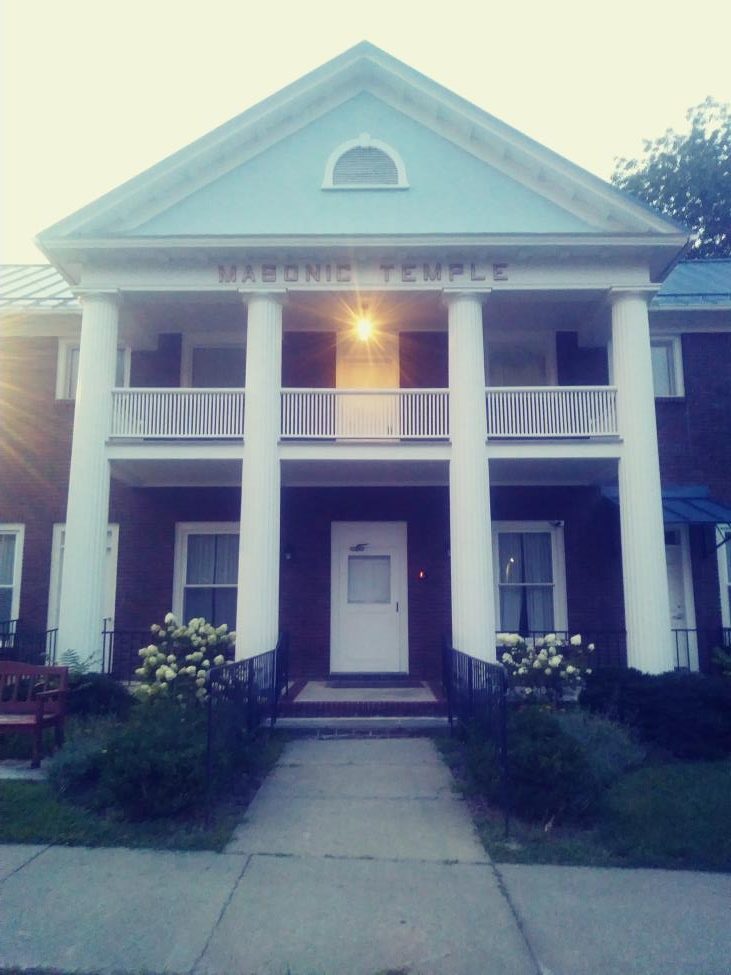
In separate actions August 26th, the Newfield Board first gave its informal consent to inviting the Tompkins County Sheriff’s Department to locate a satellite office in its hamlet. Then, at meeting’s end, the Board adopted, essentially word-for-word, the Enfield Town Board’s Resolution of August 11th that urges Governor Kathy Hochul, by executive order, to allow municipal boards to return to online meetings until society regains control of the coronavirus.
“Enfield thanks you,” this writer—and also that latter Resolution’s author—said to the Newfield Board after the measure’s passage. Though Enfield was first to suggest the executive action to the Governor—its own decision made almost by impulse at the close of a sometimes-testy session in a stiflingly-hot meeting room—Enfield’s initiative shows signs of a bandwagon effect. The Town’s request won the inter-municipal Tompkins County Council of Governments’ approval earlier Thursday. The Lansing Town Board adopted its version of the request last week. And the Caroline Town Board may do so when it meets within days.
Meanwhile, should the Sheriff find space to put a satellite office in Newfield, that, too, will bear the fingerprints of Enfield’s leadership.
In March of last year, the Enfield Town Board approved a one-year, rent-free agreement with the Sheriff that allows his Department to store a patrol car in one bay of Enfield’s Old Highway Barn. The agreement also permits deputies to use a small office there. This month, the Enfield Board renewed the agreement for three more years.
But Newfield’s challenge is more complex. Supervisor Michael Allinger concludes the Department may park its patrol car at the Highway Barn. But the deputies’ office will need to go elsewhere.
There’s no room at the Highway Department for the office, Board members agreed. Nor can the Newfield Fire Hall be used, for lack of a “room segregated;” in other words, an office kept private and secure.
Shopping around in brainstorming mode, members mentioned possible space across from the Town Hall, or more likely, an office in the old Newfield Masonic Temple, where much of the space is rented out.
Allinger claims County Legislator Dave McKenna had suggested a Newfield satellite outpost before COVID hit. The issue got sidetracked, Allinger said, but then resurfaced in a recent conversation between the Supervisor and Sheriff Derek Osborne.
Although the Enfield contract was used as a model—like the other Resolution, its words were shown Thursday on the room’s big screen—inking the lease must wait until the Town finds an available office.
In other business, quickly dispatched Thursday: The Newfield Board took a pass on an item discussed—but then tabled—earlier this month by the Enfield Board. Newfield waived away any thought of imposing a vaccination mandate for its Town employees.
“At this point it might be unnecessary,” Supervisor Allinger reasoned. Newfield’s already imposed a masking requirement at its Town Hall. And Board members have their doubts whether anyone on the Town’s payroll remains unvaccinated.
“I don’t think it’s going to be a big problem for our government,” said Councilperson Christine Laughlin. But she suspected it’ll pose bigger problems at the Newfield Schools, where new gubernatorial orders will mandate employee vaccinations.
Meanwhile, the Newfield Board set September 23rd for a Public Hearing on its revised Solar Law, one that would regulate commercial solar farms. The Town Board and its Planning Board have whittled away at the revised law at a series of meetings in recent months.
Looking at the final draft, Councilperson Casey Powers lamented she’d wanted to keep the measure simple and short. In her opinion, attempts at brevity failed. One version, displayed on the overhead screen, ran 32 pages.
###
Health Director to County legislators: No Mandates for now
by Robert Lynch, August 18, 2021
New York Mayor Bill de Blasio may demand you vaccinate before dining at Tavern on the Green. But Tompkins County’s Frank Kruppa stands nowhere close to mandating the same at Moosewood.
Nor, for that matter, will the County Public Health Director soon impose a county-wide indoor masking edict. Unless, of course, County politicians impose it for him.

At a free-wheeling discussion before the Tompkins County Legislature Tuesday night (Aug. 17th) concerning regulatory steps to stem the spread of COVID-19, Public Health Director Kruppa gently pushed back on suggestions by some lawmakers that County Government should ramp-up those regulations, possibly with mandates, mask orders, or maybe even a locally-declared State of Emergency.
“As far as mandates, I’m not a fan of them at this point in the pandemic,” said Kruppa, just returned from vacation, but already knee-deep in gradually-climbing infection numbers and a local hospitalization rate that’s grown—but at the moment, appears stabilizing—at about a dozen.
“Quite frankly,” said the Director, “I think we’ve vaccinated the people that we are going to get vaccinated, and mandating things is really gonna’ in my opinion… entrench these folks that are not vaccinated into not getting vaccinated.”
Similarly, lacking a state-imposed order, Kruppa doubted the enforceability of demanding everyone at indoor establishments mask-up, vaccinated or not.
Present statewide rules direct only that the unvaccinated be masked when indoors. On July 30th, the local Health Department issued a “Health Advisory.” It “encourag[ed] all residents, regardless of vaccination status, to wear a mask while indoors around others.” However, without stronger authority—including a potential locally-declared State of Emergency—Tompkins County lacks the enforcement tools to give its cautionary guidance some teeth.
“Shouldn’t we be more pro-active?” Dryden’s Martha Robertson, perhaps the County Legislature’s most COVID-cautious member, asked Kruppa. She noted that Cornell reports as many as 99 per cent of its faculty has been vaccinated, and that University rules mandate virtually every student get vaccinated in order to attend this fall.
“I don’t know how we would implement a county-wide mandate program of any type,” responded the Director. “Cornell students are not the same population.” Kruppa pointed to the educational institution’s distinct culture, and impliedly, its administration’s compulsory powers to deny a student’s attendance.
Robertson quickly clarified that she was not suggesting an all-out mandate. But her colleague, Health Committee Chair Shawna Black, pressed Kruppa on what would be the “breaking point” that would prompt him to go beyond his current efforts to “educate and encourage” the unvaccinated to get a shot.
“I don’t want to draw a line in the sand,” Kruppa told Black. There are “so many variables,” he said. It will be the “totality of the situation that will drive decision-making.” Kruppa rattled off two key criteria; the “severity of illness” overall, and “the severity of illness in children,” those under 12 who remain ineligible for the vaccine.
When the pandemic raged last year and into this spring, local officials were able to lean on Governor Cuomo’s repeatedly-extended executive orders to provide them regulatory cover. But those statewide orders abruptly ended with a stroke of Cuomo’s pen in late-June, leaving each community to fashion its own constraints. Taking matters into their own hands, New York City’s mayor, Bill de Blasio, and City officials this month announced a requirement that those visiting bars, indoor restaurants, gyms, or now, museums, must show proof of vaccination before gaining entry. New York City will begin enforcing its mandate in mid-September, though the rule currently faces a court challenge.
While no one locally has proposed restrictions on a par with those that may soon take hold in Gotham, Tuesday’s discussions suggested that Tompkins County’s rules—at lawmakers’ insistence—could tighten beyond those in neighboring counties. And should they do so, local political leaders are apt to drive the debate, not public health administrators.
Already, for nearly two weeks, Tompkins County Government has imposed upon its own workforce and its visitors tighter rules than apply in most other places. All employees and visitors, vaccinated or not, must wear masks at all times in County buildings. And legislators strictly enforce masking rules in their own chambers, lawmakers muffling their words with cloth even when they take the floor.
“I don’t believe we’re in a position where we need to be declaring a local State of Emergency,” Kruppa told legislators. But should the County Administrator declare one, he acknowledged, “It really allows us to do things like emergency orders and mask mandates.”
Yet even absent an emergency directive, Kruppa charted a backdoor path to power. “As a Public Health Director, I do have broad authority,” he said. “But it would be hard,” he added, “to point to something that’s different in Tompkins County that would warrant using that authority to implement something [beyond what Albany might command.]”
Nothing except, quite obviously, a difference in political will.
****
Aside from the legislative give-and-take over mandates, the Director shared with lawmakers new case statistics that while sobering, stood predictable. While the number of active COVID cases in the county stood at 108 that night—down from a high of 125 the day before—the next morning’s report would show the number higher still. Kruppa and Deputy Administrator Amie Hendrix shed added light on local hospitalizations. They said the “vast majority” of those hospitalized that day were of persons not vaccinated. And among those vaccinated hospitalized with COVID-19, some, they claimed, had been admitted for non-COVID reasons, only to test positive upon admission. They did not parse the numbers.
And a Cornell administrator, providing legislators a separate briefing, underscored the university’s low infection rate on campus by claiming that Cornellians are “eight times less likely [of contracting COVID] than being struck by lightning.”
The administrator did not provide data to back up his statistic.
###
Deal Done: Legislators buy $2.8 Million Office Site
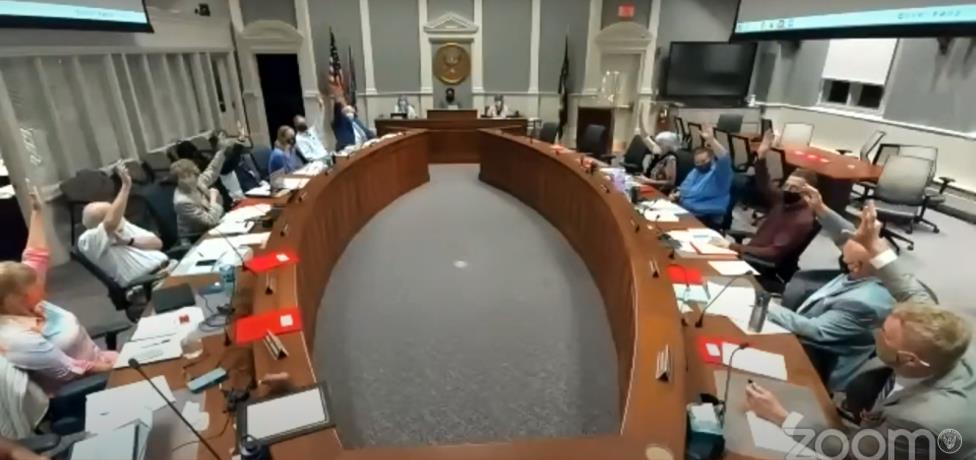
by Robert Lynch, August 17, 2021; additional reporting, August 18, 2021; 1:40 AM
“I’ve been waitin’ two years for this,” Newfield’s Dave McKenna told his County Legislative colleagues Tuesday.
“I’m going to up you a little bit, Dave,” answered Dryden’s Martha Robertson. “I’ve been waiting 20 years.”
But for us, the public shut out of County Government’s biggest secret, that two year wait may have been more than long enough.
Without referencing the long-running secret negotiations that brought them to this point, the Tompkins County Legislature Tuesday (Aug. 17th) approved the purchase of two downtown buildings adjacent to the County Courthouse as the likely preferred site for a new County Office Building. It comes at a total cost of $2.8 Million.
The 12-2 vote, which followed only a quarter-hour of lopsidedly-favorable discussion, saw lawmaker Amanda Champion and Legislature Chair Leslyn McBean-Clairborne vote against the purchase. Both lawmakers said later that the County should not be spending the money since it had already bought another site one block away two years ago as the office building’s initially-intended location.
Under the approved Resolution, the County will buy the Key Bank Building at the corner of North Tioga and East Buffalo Streets for an expected $1.7 Million and the adjacent “Professional Building,” better known as the Wiggins Law Offices, for $1.1 Million.
Environmental documents, approved as part of a companion measure Tuesday, call for the two buildings, along with the County-owned “Building C,” currently housing the Assessment Department and the Board of Elections, to be razed and a new office building constructed, one perhaps five stories high. The County has set no timetable for the office building’s construction.
“I think this is a really positive move for us as a Legislature and for the County,” said the Ithaca City’s Rich John, his opinion reflective of the Legislature’s generally positive spin. “Having looked at this issue for a very long time, this is really a positive option.”
Newfield’s McKenna, whose Downtown Facilities Committee has long steered the Legislature’s purchase with ample help from County Administration, said it was “good news” that negotiations succeeded for the acquisitions, and that now, in his words, we can “authorize people to go ahead and get the building going.”
But not so fast: As the only complication to what appeared to be a hurried, rubber-stamp approval that consumed a mere 15 minutes of a nearly four-hour meeting, Danby’s Dan Klein Tuesday proposed amendments which stripped away Resolution language that made it appear office building construction on the new site—and more specifically, the demolition of Building C—was a foregone conclusion.
“That’s a possible outcome, but it’s certainly not been decided by anybody if that’s to be the plan,” said Klein. “It’s important to me that the message we’re sending out is that we have not made any plan at all… zero.”
Klein’s amendment passed eight-to-six, but not before a pair of legislators pushed back. And their opposing comments made clear how heavily—as rumored—County Administration, specifically former Administrator Jason Molino, had become invested in this change of location and how heavily he and his staff placed their hand to the wheel.
“I think this site is more desirable,” said Robertson. “I think it’s not just true in my mind, but on many peoples’ minds. The County Administration had advised us that [the purchase fits with the County’s ‘strategic plan’],” she continued. “In the interest of communicating to the public that our staff has advised us that this is a desirable site and it’s well worth buying even though we have further down the block on Tioga Street purchased property, I would like to leave that in there,” namely the Legislature’s preference of the new site over the old.
“County Administration and County staff have made a determination that this is the desirable site,” echoed legislator Deborah Dawson, “that it’s more desirable than the other available one.”
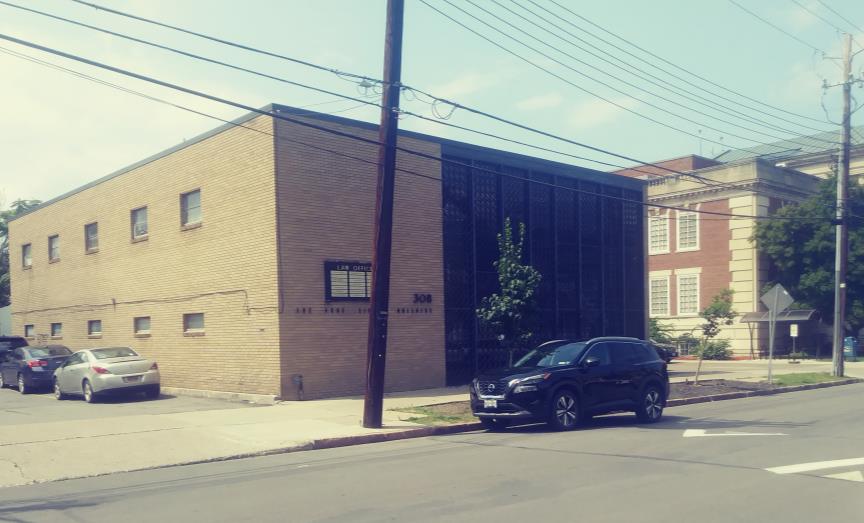
In April 2019, the Legislature voted to buy a partially vacant lot at 408 and 412-414 North Tioga, purchased at the time for the office building. Tompkins County paid the seller $1.8 Million. Plans had called for demolishing one building, sparing another, and constructing a new three- or four-story office structure on the site.
Then suddenly, with no public explanation, committee meetings got canceled and legislators began huddling in mysterious closed-door sessions, known now in retrospect to have involved the alternate site’s protracted purchase negotiations.
Committee chair McKenna has said very little to explain the secrecy. But when he addressed the Enfield Town Board August 11th—after the story had broken—McKenna argued that the talks demanded confidential treatment so as not to tip off competing bidders.
****
“This is a difficult one for me,” said Legislature Chair McBean-Clairborne, before casting her dissent Tuesday, one of only two that night on the purchase Resolution. “It has been no secret that I have been opposed to it, buying property when we had property and got rid of it.”
McBean-Clairborne referenced the Old Library, labeled surplus by the Legislature and sold to a housing developer in 2017 for a mere $925,000. The developer demolished the building, but has yet to complete the housing. McBean-Clairborne was one of only three legislators who opposed the 2017 sale.
“A few years later, here we are,” said the Legislature’s Chair Tuesday night, viewing the offloading of the Old Library as an opportunity lost. Nonetheless, McBean-Clairborne acknowledged the prospect of a new building on the newly-purchased site could be “exciting.”
The night’s other dissenter, Champion, waived off comment on her reasoning. “It’s too late,” she said, noting the hour. The Ithaca Town lawmaker said only that the County doesn’t need to spend the $2.8 Million when it holds other land available for use.
But these were minority views. Perhaps Ulysses-Enfield’s Anne Koreman best spoke the prevailing opinion: “It’s about time.”
For a much different reason, those she and her colleagues represent might say the same thing. Thank Heaven that after two, long years the Legislature’s Big Secret is finally out.
###
Enfield Board urges executive action to revive virtual meetings
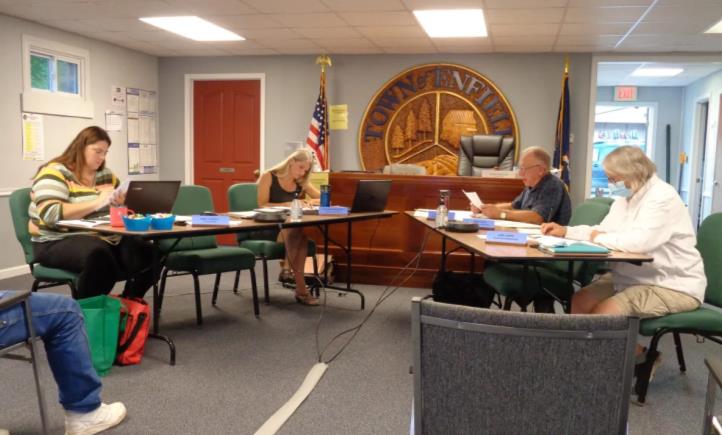
by Robert Lynch, August 13, 2021
On Wednesday night, August 11th, the meeting room was hot. The AC wasn’t cutting it. Enfield Town Board members were crammed next to one another, separated by as little as a foot or two. Two of the four members attending wore masks. One did not. And the fourth (this writer) offered a lame attempt, pulling his surgical mask beneath his mouth and nostrils so it did no good. And, oh, by the way, Tompkins County had just registered 15 new COVID-19 cases that day. The next morning, it would record another 25. No one liked how this picture looked.
Councilperson Robert Lynch, this story’s writer, the guy with the drooping mask, spoke up:
“I don’t like the prospect of this,” he cautioned. “But it may come in a month, maybe in our September meeting. We may want to draft a Resolution that recommends that New York State re-impose that waiver of the Open Meetings Law to allow us to go back to virtual meetings.”
The Board didn’t wait until September. It barely waited for Lynch to finish his thought.
“I’ll move that Resolution right now!” Town Supervisor Stephanie Redmond blurted out with a verbal leap for joy. Councilpersons Jude Lemke and Lynch raced to second her motion in tag-team unison. Members briefly laughed, drafted on the fly some impermanent prose to get them until morning, and then voted without objection to seek Albany’s help in bailing out their Town, its people—and for that matter, the people of every other town in the Empire State. (Councilperson Virginia Bryant had been excused from Wednesday’s session.)
“The Town of Enfield urges the State of New York to re-impose waivers to the Open Meetings Law that would allow municipal Boards to again meet virtually,” became the wording the Board technically adopted that night. Members would circulate among themselves a more gussied-up version the next day. But it essentially said the same thing. The Board’s plea will be sent to Albany for executive approval. Kathy Hochul will likely be sitting in the Governor’s Mansion before any official order gets signed.
“I think that’s great,” Redmond said of the impromptu motion. “I don’t want to have to mask up again.”
Virtual Town Board meetings, in Enfield and most other New York places, commenced in March and April of last year, just as the pandemic padlocked local governments. Governor Cuomo’s March 12th 2020 executive order legalized the zoom room substitute. But after extending his orders monthly until the spring of this year, Cuomo abruptly canceled his many “suspensions” this past June 24th. His rescission forced Enfield and all other towns to scurry back to their meeting halls. Enfield resumed its in-person Town Board meetings July 14th. Enfield allows a virtual option for public attendance.
But on that same July day, not all that long ago, Tompkins County’s COVID caseload stood at a mere seven persons, growing by only one or two patients a day. Just one COVID patient was in the local hospital. By contrast, a month later, the night of the Board’s August 11th meeting, hospitalizations had approached a dozen.
“It shows me that we are moving back into a restricted environment,” Councilperson Lynch observed Wednesday night. He’d monitored a trio of County Legislature meetings the day before, meetings where lawmakers scrupulously enforced an administratively-imposed masking mandate at all times within their chambers. Legislators keep mouths covered even when they speak.
“I don’t think I could suffer to get through a four-hour meeting with a mask on,” said Lynch, acknowledging that Enfield Board meetings often run long. “I had a tough time yesterday,” he admitted, “because it’s hot and it’s stuffy. I can’t breathe.”
It will be the second time this year that Enfield Board members have petitioned New York State to throw them a lifeline. In February, when vaccine was scarce and older residents worried they’d never receive a shot, the Enfield Board adopted a Resolution urging the State to allow local counties expanded discretion in distributing vaccine. The Enfield Board also asked Albany to end its objections to local health departments establishing vaccine waiting lists.
The vaccine eventually flowed, and the Tompkins County Health Department initiated its vaccine registry February 24th, only eight days after the local Public Health Director had insisted such a list “has no value.” The local registry became wildly popular.
Unlike Tompkins County government, the Town of Enfield currently imposes no indoor masking mandate for vaccinated persons. All Town Board members say they’ve been vaccinated, as do the Town Clerk and her staff. Yet Town officials could still find themselves in a bind if the County or the State were to mandate mask wearing and minimum distancing in all indoor settings.
“We’re not socially distanced at this table,” Lynch observed of Enfield’s cramped, two-table layout. “We’d have to spread way out,” he said, “and I don’t think our meeting room would accomplish adequate social distancing if everybody has to be six or ten feet apart.”
Under those portions of the State Open Meetings Law, which the Enfield Board would like the Governor to again suspend, members of the public may attend via zoom, but official decision-makers must either come to the meeting room or request a complex notification procedure that allows anyone to know a remote member’s whereabouts, and then visit him, even in his home.
Municipal leaders have lobbied the State Legislature to modernize that cumbersome section of law. But observers doubt Albany lawmakers will take up the matter before at least January.
###
Newfield Board adopts Stretch Building Code
by Robert Lynch, August 13, 2021
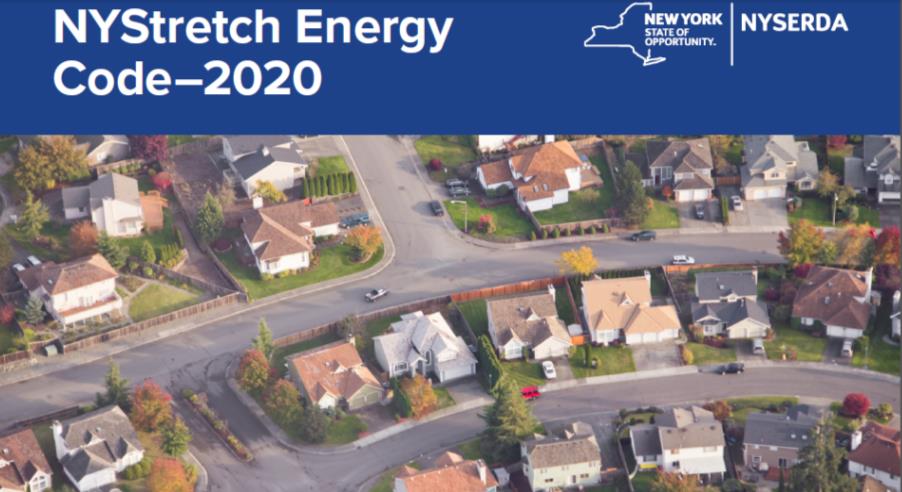
“I’ll have to vote ‘No’ on this,” Councilperson Christine Laughlin said, almost apologetically, as the Newfield Town Board Thursday (Aug. 12th) prepared to adopt NYStretch, a mildly more restrictive, environmentally-friendly building code, one that would impose new rules for construction, both residential and commercial.
Board members seldom disagree in Newfield. The Board usually votes with unanimity. But NYStretch became the exception. With the Board’s three Democrats last month signaling they’d support the added restrictions, and Republican Loughlin then voicing her concerns, the only vote in doubt Thursday was that of Supervisor Michael Allinger, a registered Independent. Allinger had kept all in suspense for three weeks, but Thursday joined majority Democrats with his qualified endorsement. NYStretch became Newfield law Thursday by a vote of four to one.
“I’ll give it a one-time shot,” said the Supervisor, Allinger observing that the optional Stretch Code is expected always to walk one step ahead of the mandated State Building Code. Consultants predict that in a couple of years, New York will mandate Stretch’s standards, but then offer even tougher Green Building options for towns and cities to impose at their discretion.
Allinger’s words Thursday implied he might not endorse future rules if they further tie builders’ hands.
“I don’t see the expense as being a deterrent, Allinger said of the just-adopted rules. NYStretch requires tighter windows and shorter piping so as to save hot water, and might, experts predict, add about $1,900 to the price of a house.
“I’ve seen penny-wise, dollar-foolish decisions made,” the Supervisor observed. As he saw it, a town may wisely need to prod a builder to act in a homeowner’s best interests. “We must take the proper way of doing things, or else people just won’t do it.”
But Councilperson Laughlin took a different stance to buttress her dissent.
“Regardless of the savings, people should make their choices for their own savings, Laughlin said. “People know the options that are out there. They’ll make their own choices.”
The Republican lawmaker predicted her Newfield Board hasn’t seen the end of NYStretch’s creeping controls. “We’ll get hit again,” she forecast, predicting tighter rules loom just around the corner.
Laughlin and many conservatives see a “nanny-state” side to NYStretch’s well-intentioned goals. At a July 22nd Public Hearing, critics faulted NYStretch for requiring builders to reserve electrical breaker box capacity for future solar panels as well as for electrical vehicle charging units. They’d also need to lay driveway conduits to someday encase those charging cables. During post-hearing discussion last month, Councilperson Casey Powers suggested that just having the conduit might prompt someone to buy an electric car.
As described to the Newfield Board in July, Stretch regulations would only apply to new homes or major renovations. They would not impact movable housing.
****
On a second issue, the Newfield Board Thursday took its final, crucial step in writing its revised Solar Law, a measure that Allinger predicts could reach a Public Hearing as soon as September. The Board decided how far a commercial solar developer must set its panels from a home or property line.
In a discussion that sometimes resembled a disorganized auction, members raised hypothetical measurements, only to have one person’s good idea shot down by another’s better one. At one point, members gauged distances based on multiples of their meeting room’s floor, estimating the board room measured 25 feet front-to-back.
Agreed-upon distances—which members stressed could be altered after the Public Hearing—set 250 feet as the minimum space to a residence, 100 feet to a residential lot line, and 50 feet to a non-residential line.
Although admitting she’s no big fan of solar farms, Councilperson Laughlin leaned toward shorter, less restrictive buffers. “Their property is their property,” she said, referring to the solar operator’s real estate.
“If you ask me, I don’t care if it’s in my back yard,” Allinger quipped, suggesting just about any limit is fine with him. Then, the Supervisor added, “But if you ask my wife….”
###
Tompkins Legislature imposes employee vaccine mandate
by Robert Lynch, August 11, 2021
For Rich John, it became real personal real fast.
“I talked on the phone with my daughter before I came to this meeting today,” John told the Tompkins County Legislature, of which he’s a member, Tuesday, August 10th. “She told me she got tested today and she has COVID. She seems to be doing great. She’s vaccinated. Her symptoms are pretty mild. But this is totally unnecessary.”

For that reason, first among all others, John said he had no quarrel about joining his majority colleagues and supporting the meeting’s lone agenda item Tuesday, namely the imposition of a requirement that all those in the County’s workforce get vaccinated against the coronavirus, or else subject themselves to periodic—likely, weekly—COVID-19 testing at County expense.
“This didn’t have to happen,” John angrily told his legislative colleagues, speaking through his—now mandated—meeting room mask. If we’d stopped the virus in mid-July, before the Delta Variant hit, and when local vaccination participation was high (though not universal), “we wouldn’t be sitting here with masks on.”
“This is real stupid,” the Ithaca legislator concluded. “And I’ve just run out of patience.”
Legislators called Tuesday’s Special Meeting specifically to address the Delta Variant’s local spread. They acted on the same today that County health officials reported that 80 of the 87 samples they’d collected during June and July from local COVID patients were of the Delta strain, a rate of 92 per cent.
With three legislators away on vacation or otherwise excused, Tuesday’s vaccination mandate passed by a vote of nine-to-two. Republican Mike Sigler and Democrat Henry Granison dissented.
“I am a firm believer in vaccination,” said Sigler. “I think vaccines are a gift. But I have trouble with a vaccine mandate as a condition for employment.”
Granison shared the reason for his dissent only after the meeting. Granison told this reporter he’d prefer “more carrots; fewer sticks.” The Ithaca Democrat would have favored the County launch a program to encourage employee vaccination for a few months before imposing any mandate. Granison also suggested universal surveillance testing of the County workforce, at least at the outset.
The vaccination mandate would commence October first. As finally worded, the revised and adopted Resolution would either require vaccination, or require for those either unable or unwilling to be vaccinated, “to undergo testing on a periodic basis.”
On advice from the County’s Human Resources Administrator,” County Government will pay for the testing. Left open-ended by the Resolution was whether testing would take place weekly or twice-weekly, alternatives legislators had weighed with health officials in earlier, supporting attachments. As left for now, testing would occur “as recommended and overseen by the County Health Department.”
Prior estimates had pegged the County-wide cost of once-weekly testing at some $15,500 per week, based on vaccination attestations of early-August. Twice-weekly testing would double the expense.
As of Wednesday afternoon, August 11th, Rich John said his daughter remained stable, her COVID symptoms still mild. He said his 20-something daughter first felt like she’d come down with a cold. But she’d lost her sense of taste and smell, prompting the revealing test.
###
Key County Committee endorses $2.8 Million land purchase for Office Building
Posted by Robert Lynch, August 10, 2021
The vote was unanimous. Afterward, legislators applauded themselves.

Offering neither critical comment, nor explaining why they’d kept negotiations hidden from the public for nearly two years, members of a Tompkins County legislative committee Tuesday (Aug. 10th) recommended purchase of two buildings adjacent to the County Courthouse, lawmakers intending both be razed to construct a new County Office Building.
“This is a once in a lifetime opportunity,” the Legislature‘s Vice-Chair, Shawna Black, said of the purchase.
This “could consolidate pretty much as much of the County staff as possible,” crowed Newfield-Enfield legislator Dave McKenna, Chair of the Downtown Facilities Committee. In Tuesday’s argument-free, half-hour session, the committee adopted not only the purchase Resolution, but also a companion action that claimed the land purchase would impose little environmental impact. The committee forwarded both measures to the full Legislature for likely action August 17th.
In closed-door discussions that date back to the fall of 2019, County officials have negotiated with owners of both the Key Bank building, at the corner of West Buffalo and North Tioga Streets, and the “Professional Building,”—better known as the Wiggins Law Offices—next door at 308 North Tioga. The combined purchase price authorized by Tuesday’s Resolution reaches $2.8 Million. Though negotiations may not yet be final, the bank building’s owners would likely get $1.7 Million; the law office’s owners $1.1 Million.
“There are very few times in Downtown City of Ithaca that you’re going to have two properties that are older buildings that will be available,” said Shawna Black. She called the likely acquisition “a very wise investment,” especially in view of recent commercial real estate appreciation.
Legislators Tuesday gave no indication they plan to divest themselves of the land the County previously bought two years ago as the then-favored Office Building site, a tract at 408 and 412-414 North Tioga Street, a parcel consisting of a large parking lot and two buildings, one a two-story former dental office. The County paid $1.8 Million for the lot in 2019. Neighbors on the Sears Street side of that property, often critical of the County’s plans, had urged their end of the lot be converted into housing. Legislators suggested Tuesday that buying their new site might placate the neighbors’ concerns.
It’s also possible—indeed, likely—that the Legislature will retain the remainder of the North Tioga Street lot as an employee parking lot. Members signaled Tuesday that when they made their 2019 purchase, the bank and law office buildings were not yet on the market.
But never addressed in Tuesday session was official justification for the secrecy that surrounded the latest proposed purchase. Both the Downtown Facilities Committee and the full legislature have huddled in closed-door executive sessions repeatedly since October 2019, with “real estate negotiations” their oft-stated topic. Even as recently as last week, after Tuesday’s Resolutions were revealed in a County website posting, neither McKenna, other committee members, nor County staff would take media questions.
****
Tuesday, only the daughter of the law office building’s architect stepped before the committee before it took its vote. J. Victor Bagnardi designed an “iconic building,” Lisa Bagnardi-Farr told legislators. Appearing remotely, Bagnardi-Farr urged the committee spare her late-father’s masterpiece, or at least incorporate parts of it in whatever it later builds.

“Don’t take everything away that Ithaca is all about.” Lisa Bagnardi-Farr
“To tear down everything and make it look like everything else is not what Ithaca is,” pleaded Bagnardi-Farr, driven nearly to tears. “Please do the right thing, she implored. “Don’t take everything away that Ithaca is all about.”
The Wiggins building, though showing signs of neglect—its “The Professional Building” sign lacks two of its name’s letters—stands most notable because of its massive two-story high doors, its façade of metal circles, and its large foyer atrium.
“He designed things well and stable,” Bagnardi-Farr said of her father’s craftsmanship. “They were original, and unique and very classic.”
But judging by Tuesday’s committee discussions, County lawmakers have little thirst for nostalgia, placing their priority on consolidating County offices next to the Courthouse.
“It does make sense combining into one central campus,” said committee member Rich John. What’s more, he said, “You’re not going to be losing value by buying real estate.”
Eyeing both the former and currently-favored building sites, John told Tuesday’s meeting, “I have confidence that we will not lose value by investing in the land at either location. It is in the 50-year long-term interest of Tompkins County and its residents.”
To that, Ms. Bagnardi-Farr might answer, “Yes, but at what cost?”
###
Tompkins County, Enfield to consider Vaccination Mandates
by Robert Lynch, August 7, 2021
“Tompkins County is committed to population immunity… [and] in order to achieve population immunity, we will need our staff to be among the leaders in vaccination.”

With those words of admonition in a Resolution handed up by two of its committees, Tompkins County Legislators will be asked Tuesday (Aug. 10th) to consider mandating vaccination for all County employees against COVID-19, or else demand that unvaccinated workers submit to weekly or twice-weekly COVID testing.
Likewise, the Enfield Town Board will the following night, Wednesday, consider a similar employee vaccination mandate.
The proposed Tompkins County policy would commence October 1st. The draft Enfield Resolution might begin much sooner, perhaps even later this month.
“COVID-19 vaccines are safe and effective at preventing COVID-19 disease, especially severe illness and death, while reducing the risk of people spreading the virus that causes COVID-19,” County officials stressed, in their attached narrative to the Tuesday Resolution. It outlined “considerations” that argue in favor of their mandate.
The attachment claims over 70 per cent of County employees have attested to their vaccination. Fifteen per cent have attested to not being vaccinated. The remaining 15 per cent, the narrative claims, have not shared their vaccination status.
The legislative supplement claims the County stands on firm legal ground with its proposed mandate. Moreover, the Legislature would call upon the County Health Department to schedule employee-only vaccination clinics and/or help employees register at local clinics. They’d also encourage vaccine access through local pharmacies or doctor’s offices.
With a large County workforce, mandatory testing for the unvaccinated would carry a price. Based on current numbers of the unvaccinated, the County projects once-weekly testing would cost it more than $15,000 per week; over $31,000 should workers be tested twice weekly.
Tuesday’s resolution declined to state how frequently the unvaccinated would be tested. Legislators would likely weigh that choice on the meeting’s floor Tuesday.
Less wordy, but more subject to revision, the draft Enfield Resolution that Councilperson Robert Lynch (this writer) will put before his Town Board Wednesday would direct that within two weeks of its adoption:
“Every Town officer, elected Office Holder, and employee of the Town of Enfield shall submit to the Town Supervisor or to that Supervisor’s designee, proof of vaccination or verifiable evidence that the applicable Officer or employee has begun a vaccine regimen against COVID-19, or else proof that such person stands otherwise ineligible for vaccination.”
Those on the Enfield payroll who’d decline to submit to vaccination, or otherwise fail to reveal their vaccination status, would “then be required to submit to weekly testing to document his or her lack of a COVID-19 infection,” either until such time that they vaccinate, or until when medical authorities lift the risk of infection.
In an August 5th email to Town Board members, Councilperson Lynch stressed that his draft Resolution carries “heightened importance” in view of the County Legislature’s similar measure. Lynch has indicated his offered language stands very open to revision by Board members Wednesday, and that colleagues should view the Resolution only as a starting point.
Enfield Supervisor Stephanie Redmond plans to post the Resolution on the August 11th Agenda.
Based on previous comments at a Town Board meeting, July 28th, all staff at the Enfield Town Clerk’s office stand fully vaccinated, but not all within the Highway Department have received full vaccination. The three Town Board members present at the July meeting indicated they’d been vaccinated.
****
As for the wisdom behind full vaccination, Dr. William Klepack, the County Health Department’s Medical Director, saw the county’s action as a no-brainer.
“Vaccination remains the most important strategy to protect an individual’s health and to stop the pandemic,” Dr. Klepack emphasized in a written opinion, after one legislator asked him to weigh in.
“Failure to deal effectively with the current variant could open the door for more threatening variants to enter our region as they emerge,” wrote Klepack. “A high enough vaccination rate shuts the door if the variant is not resistant to the vaccine. While high, our current vaccination rate is not high enough to fully achieve this end,” the Medical Director cautioned.
Reciting well-publicized national data, Dr. Klepack praised the effectiveness of the vaccine, noting that some states have reported so-called “breakthrough cases”—those among vaccinated people who still contract COVID—as low as one, one-hundredth of one per cent; with hospitalizations negligible, and any deaths attributed to vaccinated COVID patients perhaps due to other causes.
Any local departure from these national statistics may matter little, Klepack advised, as “our relatively small numbers do not rise to the level of statistical significance.”
Nonetheless, he said, “The rise in the proportion of vaccinated persons becoming cases is of concern. What our local experience means is uncertain, but one thing is clear we must stop this pandemic, and achieving higher levels of vaccination holds out that opportunity.”
As for the choice between weekly and twice-weekly testing for unvaccinated County employees, Dr. Klepack declined to state a firm preference. Yet he suggested the more often the better.
Once daily testing, the Medical Director concluded, is too expensive. Once monthly testing imposes too high a risk compared to its cost.
Using the then less-contagious variant of a year ago, Cornell’s modeling, Dr. Klepack said, “concluded screening twice a week optimal for undergraduates.” But then the Medical Director warned, “We are currently dealing with a worse variant and so twice a week is appropriate to consider.”
###
Local delegates re-nominate Molly Reynolds Fitzgerald to State Supreme Court
by Robert Lynch, August 7, 2021
“The last 14 years as a State Court Judge have left me privileged, humbled and grateful,” said Judge Molly Reynolds Fitzgerald Saturday as Democratic delegates from Fitzgerald’s Sixth Judicial District, nominated her for a second term of equal length on the court she now serves. The Sixth District includes Tompkins County.
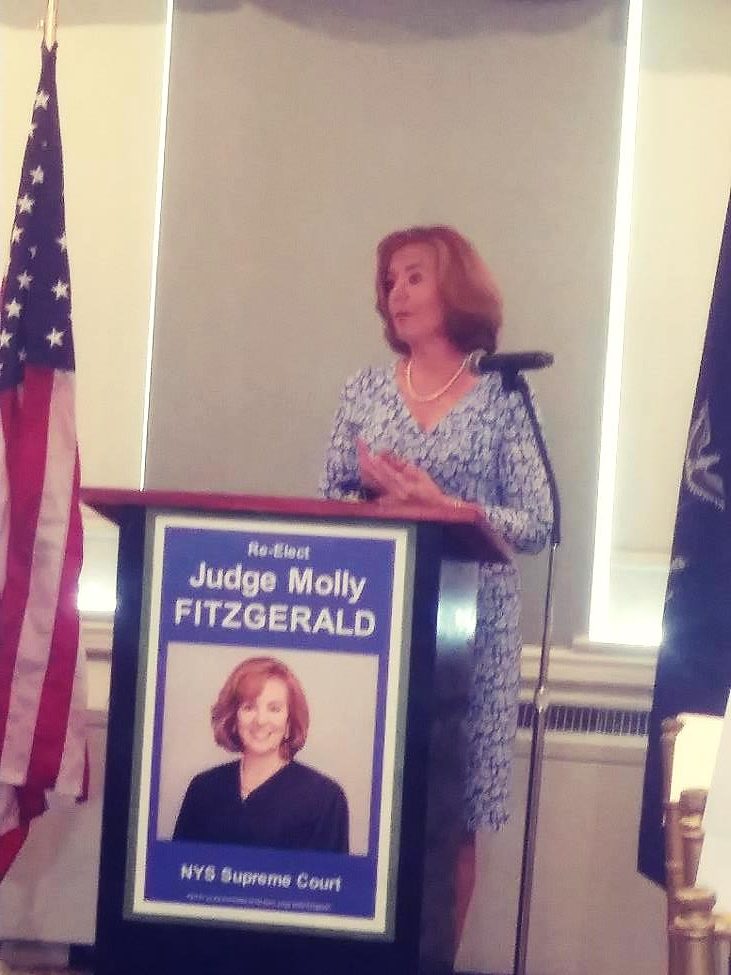
In what’s become an annual, early-August, Saturday morning ritual, Democratic Party delegates from the Sixth District’s 10-county region convened August 7th at a Johnson City golf resort to re-nominate their preferred judicial nominee, in this instance, Fitzgerald. Saturday’s brief, 30-minute formality took on all the appearances of a coronation.
The last time delegates to the Judicial Convention cast a divided vote was three years ago, when a trio of candidates sought a single State judgeship, and no incumbent stood for nomination.
Judge Fitzgerald has “always conducted herself with wisdom, judgment… and alacrity,” said Delaware County’s Tom Schimmerling, who placed Fitzgerald’s name into nomination. Following Schimmerling’s motion, the delegates endorsed Judge Fitzgerald by acclamation.
Admitting superstition about prepared speeches and preferring to speak off the cuff, the nominee related to delegates observations from her past 14 years on the State bench.
“People don’t come to court in a good mood,” Fitzgerald remarked, acknowledging the adversarial nature of judicial proceedings. But there’s an exception, she said. It’s when she performs naturalization ceremonies. Then, Fitzgerald said, newly-conferred citizens sometimes cry. They do so out of joy.
But “a judge can be intimidating,” Judge Fitzgerald also admitted. Nonetheless, she said, it’s important for everyone that “they have their day in court.”
Saturday’s nomination was tantamount to a judicial reelection, as Judge Fitzgerald faces no Republican opponent in the fall. The result of a handshake-agreement of sorts, Democrats have declined to field a candidate for a second State Court judgeship, one created by the pending retirement of Supreme Court Judge Robert Mulvey of Ithaca. Elizabeth Aherne, also from Ithaca, and like Mulvey, a Republican, seeks to be Mulvey’s replacement.
The arrangement allows both Judge Fitzgerald and Ms. Aherne to run unopposed for their respective judgeships. But here, claim Advantage Democrat. The 10-county, Sixth District’s voter registration leans heavily toward the GOP. Delaware’s Schimmerling noted Saturday that in 2007, initial returns had indicated that Fitzgerald had lost her election. Only a recanvassing of votes proved otherwise.
State law dictates Saturday’s somewhat quaint judicial nominating procedure. Party delegates are chosen from slates, apportioned by population, from the Sixth District’s many included State Assembly Districts. The procedure assigned 12 delegates from the 125th Assembly District (the “Anna Kelles District.”) As many as four of the local delegates attending Saturday serve as Tompkins County legislators. Most on the slate are lawyers. Voters become involved by first signing petitions to select the slates; and then, if necessary, by choosing among competing slates in a Primary. This year, as in most years past, only a single, Party-constructed slate ran. It precluded a Primary.
Although Molly Reynolds Fitzgerald’s official title is that of State Supreme Court Judge, Fitzgerald in recent years has been assigned added responsibilities. For three years, beginning in 2016, she served as the Sixth District’s Administrative Judge. Then, more significantly, two years ago Governor Cuomo elevated her to serve as a Justice on the Supreme Court’s Appellate Division, a mid-level appeals court, of which there are only four in the state. In Fitzgerald’s Third Department, based in Albany, five-judge panels decide appeals from lower State courts. Only the State’s highest court, the Court of Appeals, reviews Appellate Division decisions, and often declines to do so.
Judge Fitzgerald, in her acceptance remarks, took passing note of the January sixth attack on the U.S. Capitol, contrasting it with the local political legwork that brought her Saturday’s re-nomination.
“When we hear about coup attempts,” said Judge Fitzgerald, “it’s nice to know the grassroots people are still as strong.”
[Note: Robert Lynch, this writer, served at this year’s Judicial Convention as an Alternate Delegate. He has served in either a voting or non-voting capacity for this, his fourth year.]
###
Breaking: County to Buy New Site for Office Building
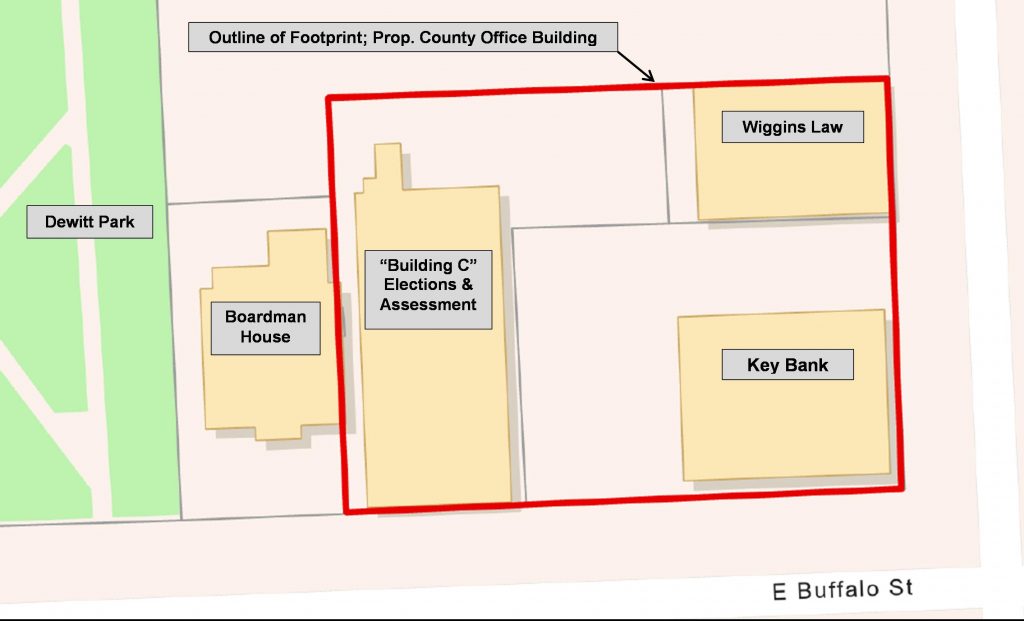
by Robert Lynch, August 5, 2021; additional reporting at 1:10 PM and 7:23 PM.
The Tompkins County Legislature, ending nearly two years of silent negotiations, never informing the public of its preferred plans, disclosed Thursday (8/5) a draft Resolution under which the County would purchase the current Key Bank and Wiggins Law Offices at 300 and 308 North Tioga Streets as the revised site for a new County Office Building.
Total cost of the purchase is $2.8 Million. Of that total, $1.7 Million would tentatively go for the Key Bank Building’s purchase; $1.1 Million for the Wiggins offices.
The disclosure was quietly tucked away in the Agenda Packet for next Tuesday’s planned meeting of the Legislature’s Downtown Facilities Committee. The full Legislature is scheduled to meet in Special Session three hours later, and could ratify the committee’s presumed endorsement of the purchase, along with an accompanying environmental review approval.
[As of late Thursday afternoon, a released Agenda for the Legislature’s August 10th meeting did not include the Downtown Facilities Committee’s Resolutions. However, those Resolutions could be moved on the floor of the meeting and acted upon at that time. On August 6th, the Ithaca Voice quoted unnamed “county staff” as predicting a vote by the full Legislature stood more likely at its next scheduled Regular Meeting August 17th.]
“This is not the way to run a county,” proclaimed Enfield Town Councilperson Robert Lynch (this writer), a candidate for the County Legislature, who’d sought unsuccessfully this spring to secure the Democratic nomination to succeed retiring legislator Dave McKenna, the Downtown Facilities Committee Chair.
“Legislative service demands transparency. It demands government inform the public of its plans, and at every step of the way” Lynch said. “Lawmakers and County Administration have negotiated this deal in the shadows for nearly two years. I’m not dumb. I’d figured it out. Still, I didn’t like what I’d suspected. My desire for greater transparency, more than any other reason, is why I ran for County Legislature. Now the word is out. Thank Heaven!”
Although he lost the Democratic Primary handily to Newfield’s Vanessa Greenlee in June, Lynch remains on the November ballot, holding an Independent line. He suspended his County Legislature campaign following his Primary loss. The Enfield Councilperson said it’s too soon to say whether this latest disclosure would prompt him to reenter the race.
In April 2019, the County Legislature approved purchase of the then-preferred site for the County’s new Office Building, a combined lot at 408 and 412-414 North Tioga Street, the site consisting of a large, parking lot and two buildings, one a two-story, brick dental office that most recently served as the County’s Downtown COVID-19 testing site. The purchase cost County taxpayers $1.8 Million. The deal closed later that year.
But rather than move forward on the demolition of the dental office, as had been planned, and proceed forward with erection of a three- or four-story new office building, the County and its Downtown Facilities Committee dithered. Monthly committee meetings were inexplicably canceled. That October, the full Legislature held a mysterious executive session to discuss real estate matters, but after which lawmakers failed to release even the briefest summary of their deliberations.
Subsequently-held meetings of the Downtown Facilities Committee often moved into their own executive sessions, the public denied access. Many of the Legislature’s recent biweekly meetings have ended in executive discussions with “real estate negotiations” the stated topic.
All the while, it was known, behind-the-scene negotiations progressed for the County to acquire the Key Bank and Wiggins Law Office buildings. The purchases, in many respects, were the brainchild of former County Administrator Jason Molino, who left the County’s employment in late-May to accept an appointment in Livingston County. Although some had expected the purchase would be finalized on Molino’s watch, it was not.
As of early Thursday afternoon, when this story was posted, Tompkins County officials had released no announcement, written or otherwise, to confirm the impending purchase. No County officials had spoken of the matter. Only the committee meeting’s online Agenda Packet provided information that a major purchase loomed in the offing.
An Environmental Resolution, drafted to accompany Tuesday’s expected purchase action on the Key Bank and Wiggins’ properties, would green-light not only the “deconstructing” (demolition) of the 1960’s-era banking building and law offices, but also of so-called “Building C,” the County-owned, current home of the Board of Elections and Assessment offices. Whereas plans for the previous site had called for an office building no higher than three- or four-stories, the environmental statement for the new site calls for “building a new County government office building not to exceed 65,000 (square feet) in size and five stories in height.”
Neither the purchase Resolution nor its environmental supporting document make any reference to the fact that the County had already bought a previous site for a building whose cost (based on 2019 estimates) could top $16 Million, even ignoring the cost of the land.
As to why this new site has eclipsed the 408-414 North Tioga Street site as the County’s favorite, the most the purchase Resolution states is that, “County Administration and County staff have determined the sites at 300 North Tioga Street and 308 North Tioga Street are more desirable than other available sites.”
Reading between the resolutions’ lines, however, one infers the final negotiated price tags for the two new properties remains far from settled. The $2.8 Million would stand as a maximum legislative-authorized outlay the County Administrator could negotiate for the combined parcels. The $1.7 Million and $1.1 Million figures are stated as the “fair market value” for the respective properties, based on the Director of Assessment’s appraisals. The purchase Resolution’s language leads one to suspect haggling on price remains.
Though the Resolution calls upon the Administrator “to execute all documents to exercise the purchase and to close on these properties in a timely fashion,” an exact timetable toward the expected demolition and reconstruction remains uncertain. The document indicates tenants of both buildings need time to relocate.
In early-February, Key Bank announced plans to open a new Ithaca branch on South Meadow Street, near Wegmans. Insiders took note of that announcement, suspecting the bank’s move fit with the County’s secret plans to purchase the bank’s downtown office.
Councilperson Lynch said Thursday that while he was saddened by the County’s impending action, he’s not surprised. In fact he’d forecast the move four years earlier, when he’d addressed the County Legislature in support of retaining the Old County Library for public use.
“Governments grow. They always have,” Lynch told the Legislature in September 2017. “Not too many years from now, some future County Legislature, confronted with the reality of cramped quarters, will ask its taxpayers to bite the bullet; to bond and mortgage its future. What might it do? My hunch is that it would revive the center-of-government concept. Demolish “Building C”, the County Annex; condemn the neighboring Wiggins’ offices and Key Bank; and construct a Courthouse Complex addition with the price tag of 10, 20, or maybe 30 million dollars.”
Yes, they will.
###
Water Protection Law gets first look by Enfield’s Planning Board
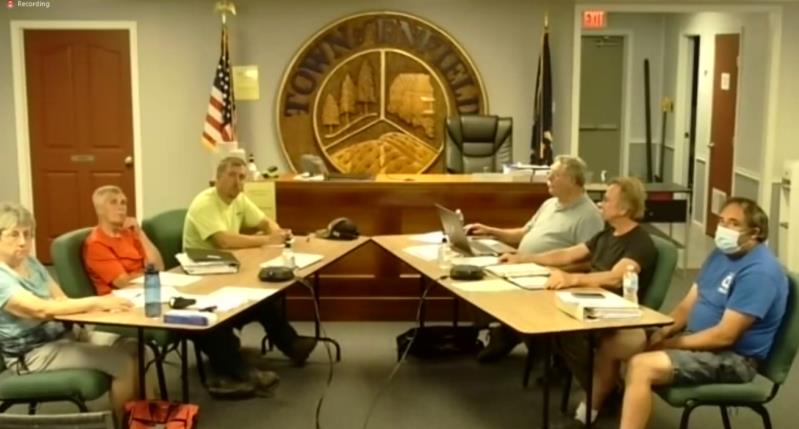
by Robert Lynch, August 4, 2021
“Do we need this law?”
Planning Board member Ann Chaffee’s offhand remark found itself co-opted by a visiting Town Councilperson (this writer) twice Wednesday night (Aug. 4th) as the Enfield Planning Board gave an initial hour-long look to a proposed Drinking Water Protection Law, hurriedly handed up in May by the Town’s mostly citizen-populated Water Protection Committee and strongly supported by Town Supervisor Stephanie Redmond.
“I think we do need this law,” answered Planning Board member Michael Carpenter. “But a bad law,” he added, “is worse than no law at all.”
Carpenter, like most of his Planning Board colleagues, agreed the Water Protection Committee’s six-page initial draft needs work. The Board invited the draft’s principal author, water resources consultant Steven Winkley, to visit the Board’s September first meeting to discuss his proposal and to answer questions. Redmond suggested the Water Committee might take a second crack at the draft as well.
Advanced with little forewarning by the Water Protection Committee May 25th, the Protection Law would extend Planning Board site plan review to certain high-use water collection facilities, as well as to those involved with disposal of solid waste, hazardous waste, or wastewater. Whenever an operation triggered review, the Planning Board would need to assess its “impacts to or upon the quality and quantity of available groundwater resources, streams, ponds, water bodies, and wetlands at or beyond the boundaries of the proposed use.” Applicants would need to specify their projected daily water demand, specify a “spill prevention plan” for applicable operations, and identify the “location of the proposed use or activity in relation to the unconsolidated aquifers in the Enfield Creek Valley.”
Two provisions of the draft law would exempt from review “agricultural” operations involving the storage or spreading of manure. But not exempted was a review trigger that would include “any proposed use or activity that involves a projected average daily water demand of 1,000 gallons per day or more.”
Suspecting the provision could implicate the watering of livestock or the irrigation of crops, Councilperson Robert Lynch and some Planning Board members took issue with the proposed law’s imperfect drafting and its potential impact on farming.
The Town should not “tie the hands of farmers,” said Lynch, who said he’d been led to believe the law would totally exempt agriculture, but now finds that it would not. Lynch called for a total agricultural exemption.
The discussion led the Board to ponder what constitutes a desirable farm for Enfield. Chair Dan Walker questioned whether the Board should distinguish a “family farm” from “an industrialized agricultural use.”
“How big does a farm have to be before we start regulating it?” asked Carpenter. He speculated that someone might buy 10,000 acres and establish a mammoth feedlot. “It’s a different world today, ”he said. “The laws are blurry.”
Supervisor Redmond, who interjected her pro-regulation comments throughout the discussion, indicated her prime concern involves commercial “water extraction” or bottling. She made several references to a hypothetical “Nestle Bottling Plant,” something the company has never proposed for Enfield.
A Nestle plant is “a hypothetical that’s never going to happen and we don’t need to worry about it,” responded Councilperson Lynch. He said he’s much more concerned about how farmers may be impacted, noting that the promotion of agriculture earns high priority status in Enfield’s Comprehensive Plan.
Carpenter suggested the draft law’s current language is “too broad” for the Board “to know how we would enforce this.” Carpenter also suggested many of the law’s provisions simply reiterate New York State regulations. It’s a “mixed up thing,” he said.
When the Water Committee quickly handed up the draft in late-May, some in Town Government had predicted a fast-paced adoption. Committee Minutes of the night had forecast a first-look by Town Planners June 2nd, Planning Board approval in early-July, and Town Board review one week later. By that timetable, the Enfield Drinking Water Protection Law would have been on its way to a Town Board Public Hearing by now.
But it is not. Writing regulatory wisdom takes time. Remember Planning Board member Carpenter’s admonition: “A bad law is worse than no law at all.”
###
Local COVID numbers appear easing in face of new masking guidance
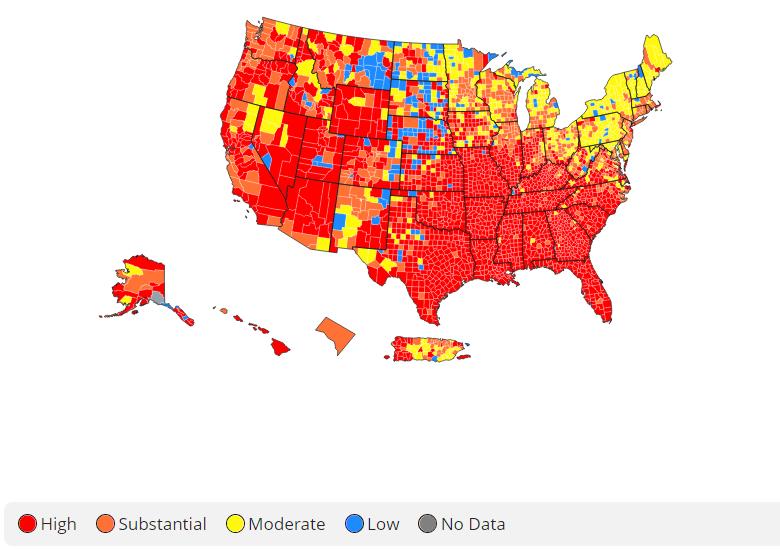
by Robert Lynch, August 1, 2021
[Update: August 3, 2021: On Tuesday morning, August 3rd, the Tompkins County Health Department reported one additional local fatality from COVID-19, bringing the pandemic’s nearly 17-month local death toll to 32. However, on that date, local hospitalizations had dropped to zero, and only six new additional active cases were reported during the prior 24 hours. Active local cases actually fell to 71, down two from the day before. / RL]
****
For one who took Statistics at Cornell, it sure looks like a Bell Curve to me. And that’s good news.
Day-by-day reports of new local cases of COVID-19, numbers that prompted the Tompkins County Health Department to issue guidance late Friday that all persons, vaccinated or not, mask-up when indoors, showed signs of easing over the weekend. Whereas new cases of the disease jumped by 12 on Wednesday (7/28), then by 20 on Thursday, the increase had eased to 15 new cases on Friday, a dozen on Saturday, and just seven by Sunday morning’s report.
As of Sunday, the day of this story’s posting, the total number of active COVID-19 cases in Tompkins County stood at 69, the highest number since April 19th, yet only two higher than the day before.
One speculates: Was this a “Grassroots spike;” a surge of cases brought on by the major Trumansburg outdoor music festival the weekend before? So far, local health officials have remained mum.
Quizzed about that possibility by a Ulysses Town official in a Thursday morning intermunicipal conference call, a Tompkins County spokesperson said the County had “no information” on that point.
Friday afternoon, as the spike in active local COVID-19 cases placed Tompkins County (just) into the CDC’s color-coded “Orange Zone” to signify “Substantial Transmission,” the County’s Health Department issued an advisory calling upon residents to practice universal indoor masking.
“Out of an abundance of caution, TCHD is issuing a Health Advisory encouraging all residents, regardless of vaccination status, to wear a mask while indoors around others,” the statement said.
The directive fell short of a masking mandate. Since the pandemic began, County officials have found themselves powerless to impose, unilaterally, more stringent orders without prior approval by Governor Cuomo and/or the State Health Department.
On Friday, the number of active local COVID-19 cases had grown to 57 in Tompkins County, a community of approximately 100,000 people. Whenever a county reports more than 50 active cases per 100,000 residents, the CDC elevates it from the yellow (“Moderate Transmission”) category to orange (“Substantial”). Were more than 100 active cases to occur, Tompkins County’s status would be heightened to red, or “High Transmission,” the status assigned to many southern and western counties.
While the Sunday number of active cases stood ten higher than when the Health Advisory was issued two days earlier, the rate of growth in case numbers may prove the more significant metric. The raw data, without supplemental explanation, did not indicate whether the intervention of the weekend—when testing presumably diminishes—affected the numbers or trends.
“Fully vaccinated individuals are encouraged to wear a mask as an extra layer of protection for the community, and unvaccinated individuals must continue to wear a mask when indoors and around others to stop the spread,” said Tompkins County Medical Director Dr. William Klepack in the Health Department’s statement on Friday.
“Local cases continue to be from both the unvaccinated and vaccinated populations,” the Department’s Friday statement further advised. It said a breakdown based on vaccination status would be released in the upcoming week.
The Department could not immediately report what percentage of these newest cases represent the so-called Delta variant, found to be more contagious, including among those infected yet already vaccinated. “As TCHD receives additional information on the prevalence of Delta variant cases, details will be shared with the community,” the Department said. The “sequencing data” which identifies variant strains is performed by Cornell University researchers, and sequencing, according to the Department, will become “available as researchers are able to process it.”
Nonetheless, despite Tompkins County’s late-July spike in COVID-19 cases—whether short-lived or not—local hospitalizations remain at manageable levels. Sunday’s report indicated that only two COVID patients were hospitalized locally, that number unchanged from the day before, and up only one from Friday. Local hospitalizations have bounced between zero and two for weeks.
****
But just as Tompkins County stopped short Friday of imposing an all-out masking mandate, it has also withheld judgment for the moment in imposing a vaccination mandate among its own employees, one that might mirror that being imposed by Governor Cuomo on State workers.
“We will have a conversation internally,” Interim Tompkins County Administrator Lisa Holmes advised municipal conferees Thursday as to a County Government vaccination policy. “We have more to discuss here,” she cautioned.
Meanwhile, in Enfield, a Councilperson’s Draft Resolution was submitted Thursday to Town Board members and other elected officials, one that would establish, upon adoption, a vaccine mandate for Town employees and Officers, including Board members.
The proposed policy, offered for discussion at the Town Board’s August 11th meeting, would require the employee submit “proof of vaccination or verifiable evidence that the applicable Officer or employee has begun a vaccine regimen,” or was otherwise ineligible for vaccination. Failure to submit such proof or refusal to vaccinate, the draft policy states, would require the person “to submit to weekly testing to document his or her lack of a COVID-19.”
“Come the August meeting, if this continues,” said the Draft Resolution’s author, Councilperson Robert Lynch (this writer), addressing the Town Board July 28th, “if COVID keeps building and we start getting more cases here in Tompkins County, we may have to take some action.”
At the July 28th session, the three attending Board members all affirmed their own vaccination. “We’re all good,” said Town Clerk Mary Cornell, confirming that she and her staff have also been vaccinated. However, Highway Superintendent Barry “Buddy” Rollins acknowledged that his department remains short of full vaccination.
###

